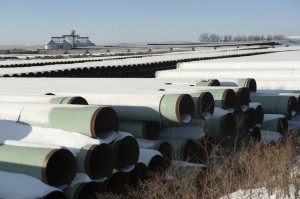Senate Narrowly Defeats Keystone XL Bill
< < Go Back
Keystone Supporters Fall One Vote Short in 59-41 Tally; 60 Votes Needed for Passage.
The Senate on Tuesday narrowly defeated legislation that would have approved the Keystone XL pipeline, delivering a political setback to Sen. Mary Landrieu , (D., La.), who had pushed for the vote as a way to show political clout in her Senate runoff race against Republican challenger Rep. Bill Cassidy.
The vote was 59-41, with Ms. Landrieu, a three-term senator who chairs the Senate Energy and Natural Resources Committee, falling one vote shy of the 60 needed to pass the legislation, despite an impassioned plea to her Democratic colleagues.
After the vote, Ms. Landrieu said at a news conference that since she knew of 14 reliable yes votes from Democratic senators, including her own vote, she thought finding one more would be reachable. Ms. Landrieu said her push to get a vote shows her tenacity on energy issues.
“I will continue to shake this place up…to push an important debate forward for not only Louisiana, not only my part of the country, but for the entire country, and that’s what I did,” said Ms. Landrieu, flanked by the two fellow energy-state Democrats who helped her try to find that last vote, Sens. Heidi Heitkamp of North Dakota and Joe Manchin of West Virginia.
Mr. Cassidy, whose identical Keystone bill passed the House on Friday, criticized the Democratic-controlled Senate for not passing its version. “If there was ever legislation that should be enthusiastically approved by President Obama and his supporters in the Senate, it should be the Keystone XL pipeline,” Mr. Cassidy said.
In the last couple of days, several senators whose votes were thought to be in play, including Independent Sen. Angus King of Maine and Democratic Sen. Christopher Coons of Delaware, said they would oppose the bill, one by one dashing Ms. Landrieu’s hopes of getting to 60.
Republicans, who won a Senate majority on Election Day, are already planning to bring the pipeline up for a vote as one of their first acts when they take control in January. But Majority Leader Harry Reid (D., Nev.) agreed to allow a vote on the bill during the lame-duck session to help Ms. Landrieu. Senate Democratic leaders, however, didn’t try to sway members to vote one way or the other.
The closeness of the vote, the uncertainty of the result, and the political importance of the vote for both Ms. Landrieu and Mr. Cassidy added to the drama of the day, as it was one of the rare times when a vote outcome was unclear in advance.
With pressure building, the bill’s supporters were especially focused on retiring Democrats who wouldn’t face any political repercussions for voting yes, particularly from environmental groups that are strongly opposed to the pipeline and say it encourages fossil fuel use and contributes to climate change.
Protesters occupied the lobby in the personal offices of Sen. Tom Carper (D., Del.), holding up a sign saying, “Sen. Carper, if you’re not a climate denier, don’t vote like one.” Eventually, the office called police to remove the protesters. Some protesters also disrupted the Senate shortly after the vote.
Her allies’ more liberal colleagues weren’t swayed. Sen. Edward Markey (D., Mass.), an opponent of the pipeline, displayed a sign calling the project the “Keystone Export Pipeline,” echoing an argument made in recent days by President Barack Obama and other Democrats who said Keystone was designed to take oil from Canada’s oil sands to Gulf Coast refineries where it would be processed for the export market, not for the U.S.
Democrats also said a main reason they opposed the bill was that it usurped Mr. Obama ’s authority on a project his administration has been reviewing for more than six years.
Among them was Mr. King, who on Tuesday dashed hopes that he might provide an additional vote, saying in a statement that “Congress is not—nor should it be—in the business of legislating the approval or disapproval of a construction project.”
Proponents of the pipeline said they have waited long enough for the administration’s decision on the project, which has faced delays and has become a political flash point in the nation’s debate over climate change and economic growth.
The pipeline would carry as much as 830,000 barrels of oil a day, mostly from Alberta’s oil sands, to Gulf Coast refineries. Of the total 1,700 miles, the southern 485 miles already have been built and are transporting oil from Cushing, Okla., to Texas.
More From The Wall Street Journal (subscription required):




